Dr. Dale Squires: “Reel Insights”
We sat down with Dr. Dale Squires to find out what he finds most fascinating about his field, including his specialty areas and research projects.
We sat down with Dr. Dale Squires to find out what he finds most fascinating about his field, including his specialty areas and research projects.
We sat down with Dr. Jerry Scott to find out what he finds most fascinating about his field, including his specialty areas and research projects.
At ISSF, we are working with scientists and fishers to reduce the impact of commercial fishing on the marine environment. Get a behind-the-scenes look as we test one method to save sharks incidentally caught in a tuna purse-seine net — potentially saving at least 20% of sharks encircled.
Photo courtesy of Pamela Maudsley-Merrill and the Tuna Conference. Pictured, from left to right: Leanne Duffy, 68th Tuna Conference Co-chair; Samantha Huff; Arif Malik; Maëlle Cornic; Lisa Ailloud; Nadya Mamoozadeh; Maite Pons; Gala Moreno, ISSF; Zahirah Dhurmeea; and Shane Griffiths, 68th Tuna Conference Co-chair. Not pictured: Ashley Stoehr.
Tuna Conference Scholarship
Zahirah Dhurmeea, University of Mauritius
“Reproductive biology and lipid dynamics of albacore tuna (Thunnus alalunga) in the western Indian Ocean”
Manuel Caboz Memorial Scholarship
Nadya Mamoozadeh, Virginia Institute of Marine Science, College of William & Mary
“An assessment of genetic population structure for striped marlin (Kajikia audax) in the Pacific and Indian Oceans using genome-wide SNPs”
Wildlife Computers Scholarship
Ashley Stoehr, University of Massachusetts Dartmouth
“Morphological and physiological specializations for sustained swimming in swordfish: through the thermocline and back again”
Desert Star Systems LLC Scholarship
Arif Malik, Flinders University
“The transition to regional endothermy in Pacific bluefin tuna, Thunnus orientalis”
Margarita Tomlinson Scholarship
Samantha Huff, Duke University
“Age of maturity of Pacific bluefin tuna”
ADMB Scholarship
Lisa Ailloud, Virginia Institute of Marine Science, College of William & Mary
“Estimating catch-at-age of western Atlantic bluefin tuna: can we do better than cohort slicing?”
Monterey Bay Aquarium Scholarship
Maite Pons, University of Washington
“Management differences among stocks and tuna regional fisheries management organizations”
Big Data Scholarship
Maëlle Cornic, Texas A & M University at Galveston
“Spatiotemporal distribution of yellowfin tuna and bigeye tuna larvae across oceanographic features in the Gulf of Mexico”
The long-term conservation and sustainable use of global tuna fisheries is our goal. It’s not easy. But through science-based practices, collaboration and advocacy, we believe it’s achievable.
World Tuna Day is upon us again, on May 2. Every year, the observance gives stakeholders on the march toward sustainable management of the world’s tuna resources a chance to reflect on recent progress, both material advances as well as symbolic ones.
First celebrated globally in 2012, World Tuna Day was established in 2011 by the Parties to the Nauru Agreement (PNA). It has increased in importance year after year, as increased concern, resources and conservation measures have been directed to promoting more sustainable practices in tuna fisheries.
Last December, the United Nations General Assembly voted without objection to acknowledge World Tuna Day as an internationally recognized event — reinforcing the importance of tuna to the world. We now have a global unified front of NGOs — including ISSF — as well as scientists, industry participants and others sharing best practices, teaming up on advocacy efforts and dedicating scientific and technological resources to improve tuna conservation. (In fact, our upcoming 2016 annual report will focus on “best practices, better solutions.”)
When World Tuna Day began, this level of collaboration and the unified will to effect change didn’t exist the way it does today.
There is still a great deal of work ahead, but the movement has gone global, it has scientific integrity, and it has the support of much of the tuna industry. It is so much more than just a day.
ISSF sponsored Skippers Workshops for the seventh consecutive year in 2016, convening purse seine fishers from around the world with marine scientists to listen and learn from each other about sustainable fishing.
From 2009 through 2015, we presented workshops on 4 continents and in 17 countries, and to vessels flying more than 25 flags. The workshops have been attended by skippers and crew from most of the important tuna fleets in Asia (Korea, Indonesia, Taiwan, Philippines), Africa (Ghana, Seychelles), Europe (Spain, France), Western Pacific (Micronesia, Marshall Islands), and North and South America (U.S.A., Ecuador, Panama, Mexico, Peru).
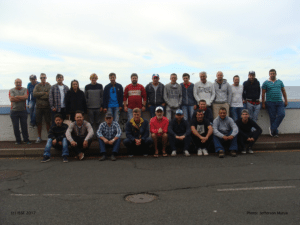
Welcoming new fleets to the workshop program
We continued to broaden our horizons in 2016, welcoming new fleets to the initiative. Half of the workshops we offered last year were conducted with tuna fishing fleets and ports never visited before, including China, Vietnam and Portugal. We received great feedback from all sides and are planning more workshops with skippers in these regions. So far we have reached over 2,400 participants — including fishers, ship owners, fleet managers, fisheries managers and scientists, among other stakeholders. Over 60 percent of the participants were captains, many with decades of experience fishing for tuna.
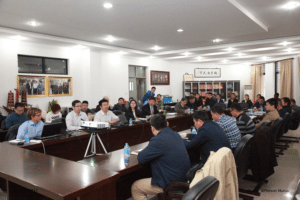
In these last several years, thanks to the insights from the captains and crew from many countries, we have learned a great deal about how each tuna fishery and fleet works. We have also heard firsthand from fishers willing to share their valuable knowledge — and appreciate the scientists and fishery managers who have taken time to hear their opinions.
Despite being the principal actors in the fishery, fishers can sometimes be left out when it comes to looking for solutions to the “sustainability equation.” Having revisited many ports on an annual basis, I have observed fishers increasing their efforts toward sustainable practices — they know it is in their best interest to maintain healthy tuna stocks and mitigate environmental impacts.
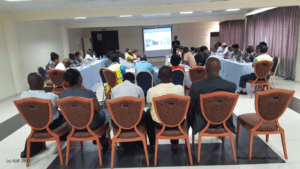
Fishers are adopting many recommended sustainable practices voluntarily, even when it brings additional work to an already demanding job. In fact, many of these ideas — such as the design of non-entangling FADs, and methods for releasing bycatch from the deck safely and with easy-to-use equipment — emerged through direct cooperation between skippers and scientists. Some captains and ship owners have taken ISSF scientists on board their vessels during commercial fishing trips to let them conduct important bycatch mitigation research.
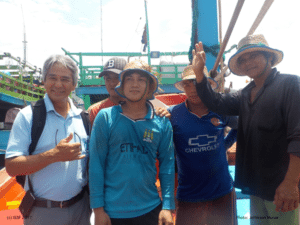
Thinking “small” to reach more skippers
ISSF’s Skippers Workshops examine technical bycatch-reduction approaches not only for the tuna fisheries of large commercial purse seiners, but also for small-scale tuna vessels. Last year, we made a point to interact with skippers from small vessel fleets like those of Indonesia and Vietnam.
Scientists and fishery managers often poorly understand the specific fishing methods used by small tuna vessels. To change that, scientists working with ISSF have been collecting information on these fishing gears and practices to develop customized bycatch-mitigation solutions.
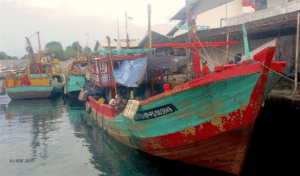
For instance, unlike large purse seiners, these smaller vessels do not have high-tech fish finders and satellite buoys; our research on echo-sounder buoy selectivity is not applicable to them. Instead, other methods of fish pre-estimation — such as visual cues and the use of specific guidebooks to distinguish between tuna species like yellowfin and bigeye tuna — are provided.
Training trainers to spread the message
Reaching these small vessel fleets can be challenging due to geographic dispersion, and small purse seine vessels number in the thousands. For this reason, ISSF has piloted a train-the-trainer program in Indonesia.
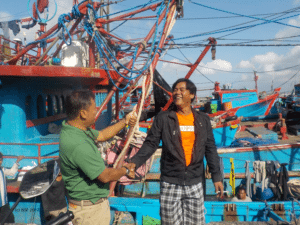
A team of local fisheries scientists from the Indonesian Research Center for Fisheries Management and Conservation (RCFMC) has been trained by their colleagues with ISSF to host additional skippers workshops at multiple ports around the islands of this archipelago. While ISSF provides multiple online tools like translated videos and guidebooks to facilitate training globally, reliable access to the internet by fishers is often difficult. For this reason, having in-person discussions in their native language and with qualified trainers greatly increases the training’s value and results.
Step by step, positive patterns are emerging in the tuna fishing fleets of the world. For example, non-entangling FADs — key to reducing bycatch — are now the norm in three out of four tuna fishing regions (e.g., Indian Ocean, Atlantic Ocean and Eastern Pacific). That’s notable progress when you consider that this kind of FAD did not even exist five years ago.
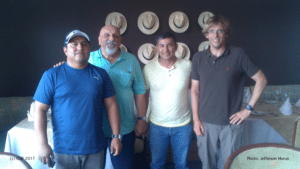
Making progress on best practices
The next step is to move towards biodegradable FADs in order to reduce marine debris, and we have been talking with captains about how best to accomplish this.
Recently, ISSF organized in San Sebastian, Spain, a small-scale workshop with experienced skippers and scientists to find the best ways to move this issue forward. Again, captains offered their insight to help design non-entangling biodegradable FADs, customized to best suit the conditions in each oceanic region. Trials are on the way that will test FADs built with these natural materials.
Increasingly, more and more vessels are routinely using best practices — developed through scientific research at sea, in conjunction with vessel crew — to release accidentally caught sharks, turtles and manta rays. We’re gratified that in 2016 we reached a record number of captains to share these best practices — over 340 skippers.
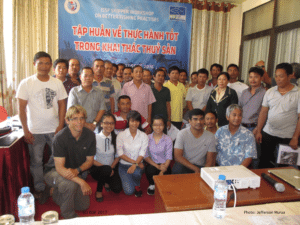
To date, more than 1,200 skippers and 1,000 industry stakeholders (crew, ship owners, fleet managers, cannery managers, etc.) have been part of the ISSF Skippers Workshop program. To our knowledge, ISSF’s program is one of the most successful fisher-industry-scientist collaborations in the world. Fishers are uniquely capable of facilitating the discovery of better, practical solutions to bycatch mitigation in today’s fisheries.
Dr. Jefferson Murua works in the Marine Research Division of AZTI, a non-profit foundation committed to the social and economic development of the marine environment and food sector. Dr. Murua also conducts educational workshops and research on behalf of ISSF.
An introduction to the mission and work of the International Seafood Sustainability Foundation
An overview of the major commercial tuna species and fishing methods used to catch them.
A definition of “bycatch” and an overview of ISSF’s bycatch-mitigation research and educational programs